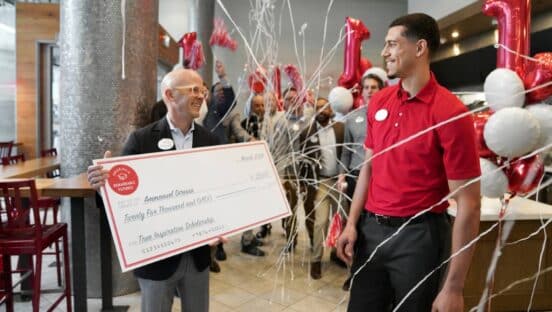When Jerry Reese was finishing his journalism degree at Loyola University in New Orleans, he decided to pick up a part-time job in the kitchens of Dat Dog. He learned the ins and outs of the hot-dog fast casual’s distinctive menu, which features dogs with toppings like crawfish and alligator. And upon graduation, he, like many other Dat Dog employees, rose through the company ranks.
Today, Reese is the director of franchise development. He initiated one of Dat Dog’s signature community partnerships with Son of a Saint, a mentoring program that engages fatherless boys. Now 25 years old, Reese likes to get out of the corporate office and work in the stores; he’s also one of CEO Bill DiPaola’s trusted brand representatives.
DiPaola is passionate about hiring and working with millennials, or those members of Generation Y who were roughly born in the 1980s and 1990s. Dat Dog’s primary customer base is composed of millennials, so young employees have unique insight into their desires. And with DiPaola’s guidance and faith in them, Dat Dog’s millennials experience something of upmost importance at work: a sense a purpose. They have high job satisfaction, which leads to high productivity.
Reese describes DiPaola’s leadership as similar to an octopus. “The head is the head, but the tentacles can move,” he says. “We have a different way of thinking and prioritizing what’s important.”
The (latest) greatest generation?
Reese is just one of thousands of millennials finding success in the limited-service industry, and DiPaola credits many of Dat Dog’s accomplishments to employees like him. The brand was recently featured in Food Network Magazine for its Crawfish Etouffee Dog—an accolade DiPaola credits to the work of his Generation Y staffers. “If you trust them, are positive with them, and let them have control, you have no idea the level of success that they will bring to the organization. I’m building a whole business off of it,” he says.
Ivar’s, a large and diversified seafood brand based in Seattle, employs 1,300 people during its peak summer season. Two-thirds are millennials who work everywhere from behind the counters of the quick-service fish bars to the waitstaff at the full-service restaurants and at the corporate offices.
For Patrick Yearout, director of recruiting and training at Ivar’s, having different generations on staff is an essential part of success. It provides diversity of knowledge and perspectives, which keeps the brand relevant. Members of Generation Y are often tech-savvy and can help provide fresh insights on products, marketing, management styles, and more. Even when they’re new to the industry, millennials are likely to point out problems and possible solutions. “If you’re open to that, it can make you a stronger and better company,” Yearout says.
Travis Boersma, CEO and cofounder of Dutch Bros. Coffee, also finds millennials to be solution-driven; their focus is on answers, not problems. The majority of the Oregon-based coffee drive thru’s 7,500 employees are Gen-Y, and Boersma and his team often count on them to become managers and operators. Dutch Bros. only sells franchises to people who have worked within the brand; millennials are often good candidates because they tend to embody the brand’s values, like being self-motivated or involved in humanitarian efforts.
“Millennials are about serving and helping one another for the greater good,” Boersma says. “And if you’re transparent about standards and expectations, they’ll hold themselves accountable.”
Bad reputation
For executives at many brands, the word millennial sends shivers down their spines.
International professional services firm Deloitte conducts research on workplaces, including restaurants in both the full- and limited-service sectors. The perception of millennials is not very positive, says Charlie Buchanan, a senior manager at Deloitte. Some may stereotype them as entitled and addicted to technology, he adds.
But in Yearout’s and Boersma’s opinions, such catchalls hold little weight. “If you really listen to people and get to know them, you’ll find there’s a wide variety of differences within the millennial generation,” Yearout says. He advises older workers to remember how they felt as young people, trying to find their way in the world.
Most stereotypes encompass an element of truth, but those supposed negatives can become positives when dealt with correctly.
“It’s true: Millennials are challenging, and they don’t have the same traditional deference to authority that my generation had,” DiPaola says. “They show their respect in a different way, through willingness to engage with the brand and through questioning what I bring them. To others, that reads as disrespectful, but I love it.” Oftentimes, challenging ideas can ensure good ones come to fruition.
Ethics and purpose are at the core of what many Gen-Yers want in their careers. “What is often interpreted as entitlement is actually a strong sense of fairness,” Boersma says. Part of being treated fairly is being trusted to make decisions about scheduling, self-expression, and benefits, and with information about the company, he adds.
Furthermore, millennials are willing to work through conflict, so long as it is transparent, to develop relationships and trust, Boersma says. “They want to be trusted. So does everybody.”
It’s important to recognize that at their core, so-called “millennial” values are universal. When it comes to improving things like work flexibility, transparency, and feeling appreciated, all generations can benefit, Buchanan says. He adds that millennials strongly believe in bringing their best selves to work. Restaurants could foster that dedication through flexible scheduling or competitive benefits, but Buchanan cautions it’s not a one-size-fits-all model. Ultimately, such policies benefit all generations.
Things like flexibility and a sense of purpose are important to most people, but not everyone is willing to ask for them. “Millennials are really driving us to look hard at ourselves and ask quality questions about what we’re trying to achieve. They’re helping shape the world into what it will be,” Boersma says.
Pledging allegiance
Gen-Y priorities may have universal appeal, but knowing how to retain young workers is far from common knowledge. Restaurants can’t easily offer the game- and snack-room culture that a tech company can, and those kinds of perks only work when they arise from real relationships.
“Millennials have an acute sense of what’s right and what’s wrong, and what’s real and what’s fake,” Boersma says. In other words, they can tell when an employer is trying to buy loyalty through something as superficial as a ping-pong table but skimping on career advancement or health benefits.
Frequent follow-ups, trainings, opportunities to go to conventions, and friendly competitions all encourage employees to move up in the organization and feel that they are making a difference within it, Yearout says. Ivar’s also encourages employees to share their interests with supervisors so aspects of those passions can be incorporated into their work, whether it’s improving the brand’s social media or developing new community partnerships.
Younger workers’ high bar for technology can also incentivize a restaurant to update its digital side. “The technology that millennials have at home is often far superior to the technology they have when they go to work,” Buchanan says. It could be harder for superiors to engage younger employees without the technology they feel comfortable using, he adds.
Having conversations and truly listening to what millennials want, think, and believe is the key to harnessing their potential. DiPaola credits his listening skills to the excellent relationships he’s developed with people like Reese.
“Compromise is like a four-letter word,” he says. “But what’s worse? To believe in something so fully that you’re willing to go down the wrong road? Or is it better to actually listen to what someone else’s experiences are and take action based on what you hear?”
The best ideas may come from the much-maligned millennial generation. Or they may come from someone else.
Summing up one of the most valuable lessons he’s learned in his decades as a recruitment manager, Yearout says, “Not all of the best ideas have to come from me.”













